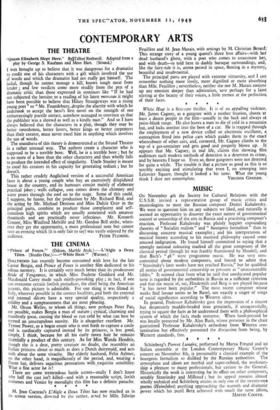CONTEMPORARY ARTS
THE THEATRE
"Queen Elizabeth Slept Here." By)Talbot*Rothwell. Adapted from a play by George S. Kaufman and Moss Hart. (Strand.) I WAS brought up to believe that it was dangerous for a dramatist to credit one of his characters with a gift which involved the use of words and which the dramatist had not really got himself. The jackal, though he cannot manage a kill, knows tough meat from tender ; and few verdicts come more readily from the pen of a dramatic critic than those expressed in sentences like " If he had not subjected the heroine to a reading of his latest morceau it might have been possible to believe that Hilary Strangeways was a rising young poet " or " Mr. Fauntkbury, despite the alacrity with which he undertook to accept the hero's first novel on the strength of one embarrassingly puerile extract, somehow managed to convince us that the publisher was a shrewd as well as a kindly man." And so I have always believed that the characters in a play, though they may be better swordsmen, better lovers, better kings or better carpenters than their creator, must never excel him in anything which involves the use of words.
The soundness of this theory is demonstrated at the Strand Theatre in a rather unusual way. The authors create a character who is supposed to be a terrible bore. Well, he is a terrible bore ; but he is no more of a bore than the other characters and thus wholly fails to produce the intended effect of singularity. Uncle Stanley is meant to excel his creators in his capacity for generating tedium ; but he doesn't.
This rather crudely Anglicised version of a successful American farce is about a young couple who buy an excessively dilapidated house in the country, and its humours consist mainly of elaborate practical jokes ; walls collapse, soot comes down the chimney and water pours through the roof on to the stage. Some of this could, I suppose, be funny, but the production by Mr. Richard Bird, and the acting by Mr. Michael Denison and Miss Dulcie Gray in the principal parts, combine to produce those complacent and self- conscious high spirits which are usually associated with amateur theatricals and are practically never infectious. Mr. Kenneth Connor, Miss Winifred Melville and Mr. Gordon Bell strike, when- ever they get the opportunity, a more professional note but cannot save an evening which (it is only fair to say) was vastly enjoyed by the


































 Previous page
Previous page